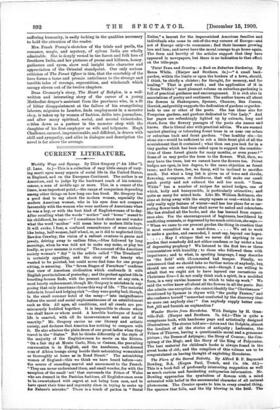C URE,ENT LITERATURE.
Worldly Ways and Byways. By Eliot Gregory (" An Idler "). (J. Lane. 6s.)—This is a collection of racy little essays of vary- ing merit upon many aspects of social life in the United States, in England, and on the European Continent. The author is an American, and to judge by the backward reach of his reminis- cences, a man of middle age or more. This, in a censor of the times, is an important point,---the range of comparison depending among other things on how long one has lived. Mr. Gregory has a good deal to say about the modern woman, especially the modern American woman, who in his eyes does not compare favourably with the women who were mothers of Americans when he was a boy, or with the best kind of Englishwoman of to-day. After recalling what the words " mother" and " home " meant to his childhood, he says :—" I sometimes look about me and wonder what the word mother' will mean later to modern little boys. It will evoke, I fear, a confused remembrance of some centaur- like being, half-woman, half-wheel, or, as it did to neglected little Rawdon Crawley, the vision of a radiant creature in gauze and jewels, driving away to endless fetes,—fetes followed by long mornings, when he was told not to make any noise, or play too loudly, as poor mamma is resting." The account of the American society woman's " day " in the article called " The Treadmill" is certainly appalling, and the story of the beauty who wanted to be painted, but could never find time for one proper sitting, is amusing. The " Seven Stages of Furniture" confirms that view of American civilisation which confounds it with English provincialism of yesterday ; and the protest against life in boarding-houses finds, with the present reviewer at any rate, a most hearty endorsement, though Mr. Gregory is mistaken in sup- posing that only Americans choose this way of life. " The material defects in board and lodging sink "—they were pretty bad, though, in the small summer hotel of the essay—" into insignificance before the moral and social unpleasantnesses of an establishment such as this. All ages, all conditions, and all creeds are pro- miscuously huddled together. It is impossible to choose whom one shall know or whom avoid. A horrible burlesque of family life is enacted, with all its inconveniences and none of its sanctity." Mr. Gregory envies us our literary and artistic society, and declares that America has nothing to compare with it. He also admires the plain dress of our great ladies when they travel in the " States." But he thinks differently of the style of the majority of the Englishwomen he meets on the Riviera. " On a fair day at Monte Carlo, Nice, or Cannes, the prevailing conversation is in English, and the handsome, well-dressed sons of Albion lounge along beside their astonishing womankind as thoroughly at home as in Bond Street." The astonishing women of England—this we think we have heard before—are the source of unending marvel and amusement to the French. "They can never understand them, and small wonder, for with the exception of the small set' that surrounds the Prince of Wales who are dressed in the Parisian fashions, all Englishwomen seem to be overwhelmed with regret at not being born men, and to have spent their time and ingenuity since in trying to make up for Nature's mietake." There is a touch of pathos in " Social
Exiles," a lament for the impoverished American families and individuals who come to out-of-the-way corners of Europe—and not of Europe only—to economise ; find their incomes growing less and less ; and never have the moral courage to go home again. The form and brevity of the articles suggest that they have appeared in newspapers, but there is no indication to that effect on the title-page.














































 Previous page
Previous page